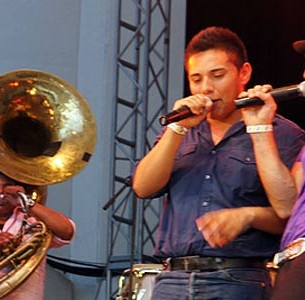
“I pretty much thought about it like everyone, else, like, ‘what’s that oopmah music?’”, says Wil-Dog, Ozomatli’s bass player for nearly two decades. Wil-Dog is commenting on how a Jewish musician in a trailblazing alt-latino-world fusion band developed a love for banda, one of the most iconic Mexican regional musics.
The genre of banda, a vibrant brass, wind and percussion-heavy genre played by large ensembles, developed in in northern Mexico, particularly in the state of Sinaloa. It emerged as a 19th century fusion that incorporated German settlers’ polkas and waltzes, the military band instruments and rhythms that the French invasion left behind and ultra-mestizo vocals soaring in and around and on top of it all. A hundred years or so later, the banda brought by Mexican immigrants took root in Los Angeles and many other sites in the U.S.

Wil-Dog’s love for banda has existed nearly as long as his time with Ozo. He first discovered it while in highschool thanks to a girlfriend from Michoacan. It wasn’t all that much to his liking, he says, until the novia took him to see the renowned Banda Limón with the famed Coyote as the lead singer: “I was so impressed with the power and dynamics, the horns and drums drew me in.”
Today, he composes and sings with some of L.A.’s most prominent bandas such as Banda Viento de Oro, which raises many a musical eyebrow, says Wil-Dog: “People trip out that I’m a white guy and I sing banda!” At first, he actually didn’t intend to be a vocalist, but was trying to learn to play the tuba. One destined evening at the afterparty of one of Ozo’s Hollywood Bowl concerts for which they had hired a banda to accompany them, the banda wanted to keep on going, explains Wil-Dog: “So, I was like, who’s gonna sing? ¡Tú, güey, tú!”, because they had noticed that Wil-Dog had sung along to all their songs.
In his banda alter-ego, Wil-Dog throws down the Spanish and the güeyes (a sort of equivalent to “dude”) with total abandon and remarkable skill. He takes the name “El Gavachillo” from the word “gabacho”, a somewhat derogatory term for an anglo. But the diminutive “illo” on the end, in addition to evoking “Tigrillo”, a famous banda singer, makes it almost affectionate – “softens the blow” he adds.

Wil-Dog is now composing, often by modifying the standards of banda, although he stays away from narcocorridos, the epic ballads associated with drug trafficking. He plays bodas (weddings) and quinceañeras (coming-of-age parties for 15-year-old girls). The paisas, he describes, react positively to his participation in the genre: “The community is really inviting. Usually the only white people they see are their kid’s teachers, their teachers, their bosses. I’m on stage singing their music. There’s some dynamics going on there, I can feel it.”
Banda is the soundtrack of entire communities throughout the U.S., and now taking on new shades in its new U.S. home as the drummers in particular, says Wil-Dog, become imbued with a rock and roll kind of energy. However, he is frustrated that the music is dismissed by so many: “It’s not considered sexy – there’s some disconnect.” It’s not liked, he adds, by “the white cultural mindset…the think tank thinkers – the tastemakers – the people that decide what’s cool” because it’s “straight from the rancho!
Some of the disconnect may also have to do with resistance to the over-the-top image and outfits associated with the genre. When I saw Wil-Dog as El Gavachillo a few years back at SXSW, he wore the traditional huge cowboy hat and boots. However, he has now modified his look with a streamlined hat, though he still wears the huge buckle that says “Perrito”. (Little Dog). The style change came in response to a trumpet player friend who remarked, “Ey, güey you gotta dress like you! You are already different, you don’t need to fit in! Wil-Dog concludes, “I just decided to keep it Wil-Dog and maybe that’s good enough”.
Having witnessed El Gavachillo several times (SXSW 2010 and Lincoln Center Out of Doors 2012) I am here to say it is more than good enough. His slightly raw voice adds just the touch of hipster panache, which along with high-energy punk/new wave covers complete with plenty of the requisite swagger and pelvic thrusts take banda to a place it’s never quite been before.
Ultimately what shines through in his performances is a genuine love and respect for the genre. Wil-Dog, aka El Gavachillo, is happy to be the hipster ambassador for a music of what he terms the ‘invisible people’ in our society: “They are in in our kitchens, taking care of rich kids. They are the service community. They deserve to be looked at and noticed just like everybody else. At least I can get the discussion even started with this music. It deserves a look.”
